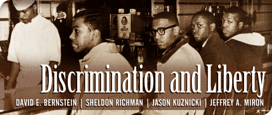Commenters at The Volokh Conspiracy have been asking us for comment about the controversial case Shelley vs. Kraemer (1948). This case concerned racially restrictive (though nominally private) contracts for property transfer.
Suppose, as happened in Buchanan v. Warley, that the U.S. Supreme Court invalidated government-crafted racial zoning laws. And suppose that in response, white property owners all agreed never to sell the properties in their racially segregated neighborhood to anyone but whites. And they made private contracts to that effect.
Doesn’t this prove, the critics ask, that private means were more than adequate to keep discrimination in business?
I don’t think it proves nearly so much. Indeed, I’d turn the question around somewhat, and I’d ask the following: By what power does the federal government enforce a racially restrictive contract? It may well be that owners can write such covenants, and that they can voluntarily comply with them, but that the state might find itself powerless to enforce them. This would be a happy outcome and would square the circle of state and private discrimination, at least in this area.
As I wrote in my paper “Never a Neutral State: American Race Relations and Government Power”:
[I]t cannot be said that a restrictive covenant is a purely private act. Although the freedom of contract has long and correctly been thought central to economic liberty, this freedom is self-evidently neither absolute nor strictly private; a contract is, after all, a formal demand for state action in certain circumstances. Contracts to commit murder, or to engage in fraud, have never been valid, and this is obviously in keeping with a view of justice centered on individual rights: Although, as the legal dictum has it, ‘agreements must be kept,’ this has never been an absolute injunction. Not only would we find at the heart of these contracts an action inimical to the liberties of others, but we would also find it hypocritical that the state could be called to enforce a contract of this type while still justifying its own existence on the basis that it vindicates the rights of its citizens.
As these extreme examples show, limits on the power of government are also limits on what the government can be asked to do by private individuals, and thus even in contracts, some limits to state authority may apply. A government… that is forbidden from applying the laws unequally based on race might also be forbidden from enforcing racially restrictive covenants.
This reasoning is not without its dangers, in that it implies some redrawing of what we usually think of as the public-private divide. But it’s more or less what the Supreme Court concluded in Shelley:
These are not cases, as has been suggested, in which the States have merely abstained from action, leaving private individuals free to impose such discriminations as they see fit. Rather, these are cases in which the States have made available to such individuals the full coercive power of government to deny petitioners, on the grounds of race or color, the enjoyment of property rights…
If we’re willing to accept that state action to enforce a contract remains state action all the same, then Shelley isn’t such a leap after all, and the supposedly “private” discrimination of the racial covenant was no such thing. It was a state-enforced discriminatory action, and thus clearly impermissible.

